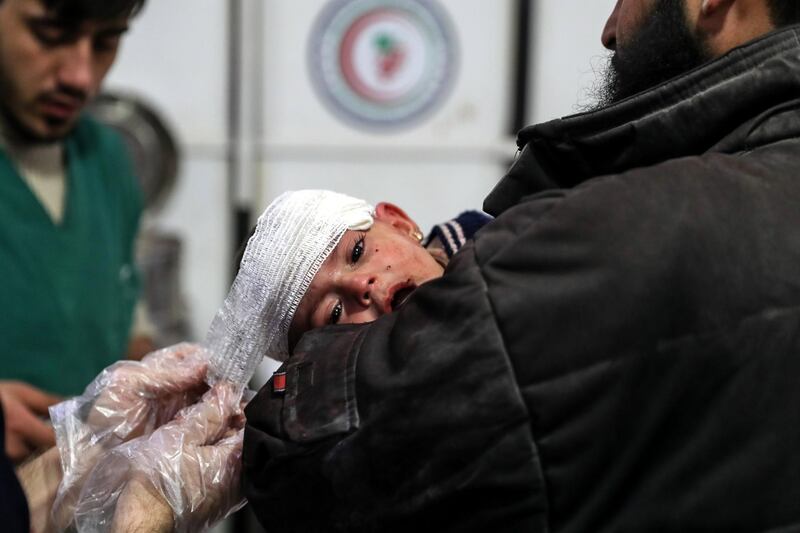The United Nations will be hosting on Tuesday a unified Syrian opposition in Geneva for the first time as the body's eighth round of peace talks opens in a bid to end the six-year conflict.
It comes after the disparate opposition groups announced on Friday last week that they would send a unity delegation to represent them in Geneva.
The UN-brokered talks have achieved little since fighting broke out in 2011, but progress now looks possible with a unified opposition and the emergence of Russia as the key dealmaker.
The latest round is expected to cover four main topics: a new constitution, future elections, governance and combating terrorism.
UN peace envoy Staffan de Mistura, who describes himself as a "chronic optimist", has voiced hope that this round of talks will mark the first "real negotiation". But for real progress to be achieved, the rival sides will need to overcome the hurdle that has derailed past discussions, the fate of Syrian president Bashar Al Assad.
Michael Rubin, resident scholar at the American Enterprise Institute, a DC-based think tank, believes it's “foolish to be optimistic” about resolving the Syrian crisis.
______________
Read more:
[ US concession to Turkey reflects concerns over Syria ]
[ Halt in US support not a problem, but not visible yet: Syrian Kurds ]
[ Besieged Syrians eating trash, fainting from hunger — UN survey ]
______________
"The question is whether all sides have given up trying to win on the battlefield what they can't win at the negotiating table. The answer to that is they have not," he told The National.
“If the Assad regime believes it has Russia and Iran on its side and that Saudi Arabia, Turkey, and the United States aren't willing to support the opposition any longer, they're going to try to eradicate the opposite rather than compromise with it."
Mr de Mistura has already directly told the main opposition grouping, the Saudi-backed High Negotiations Committee (HNC), that its demand for Mr Al Assad's ouster “may no longer be acceptable”.
In September, Mr de Mistura said the HNC needed to be "realistic" and realise "they didn't win the war". Those comments infuriated the opposition.
“The fact that the opposition isn't demanding Mr Al Assad's removal as a precondition [to entering into direct talks with the Assad government] suggests they recognise the reality of the Syrian leader's strength,” Mr Rubin said.
Backed by Russia's decisive military support, Mr Al Assad's government has regained control of 55 per cent of the country, including major cities Damascus, Aleppo, Homs and Hama, and around two-thirds of the population lives in regime-held areas.
The rest is carved up between rebel factions, extremists and Kurdish forces.
“Success may be in the eye of the beholder, but there is momentum for the political process,” said Andrew Parasiliti, director of the RAND Center for Global Risk and Security.
“The opposition is unified coming out of its meeting last week in Riyadh. Some may dislike that events are being driven by Russia, Iran, and Turkey and that Mr Al Assad does not seem to be leaving, but that is the reality heading into the talks,” Mr Parasiliti said.
The desperate HNC agreed with other opposition groups and figures during talks in Riyadh to send a 36-member unified delegation to Geneva led by HNC head Nasr Al Hariri.
On Sunday, the US state department welcomed the opposition unity push as "a positive step" and said that now was the time for the Syrian regime "to enter into substantive negotiations in Geneva".
“While there is much unsettled and the situation is fragile, the war is winding down, and that itself should be good news — for Syrians, and, hopefully, for the Geneva process,” Mr Parasaliti said.
The opposition has said it is prepared to enter into direct talks with Mr Al Assad’s government without preconditions. The delegation includes groups based in Moscow and Cairo, which take a softer approach on the fate of the Syrian president.
News that the opposition had unified came after Riad Hijab resigned on Monday as HNC leader over what he called "attempts to lower the ceiling of the revolution and prolong the regime".
Mr Al Hariri, the HNC's chief negotiator at previous rounds of talks, has insisted that Mr Al Assad needs to go. There were no immediate signs that the new unified grouping will row back on this stance. The Syrian government, meanwhile, has not yet named its delegation to the talks.
The new round of talks will take place nearly a week after leaders of Syrian rebel-backer Turkey and regime allies Iran and Russia met in the Russian resort city of Sochi, where they supported a comprehensive dialogue for Syria.
Russian president Vladimir Putin called for a "congress" of Syrian regime and opposition figures, saying this would be a "stimulus" for Geneva.
Moscow has increasingly taken centre-stage in international efforts to end the conflict, especially as US president Donald Trump's administration has pulled back from taking a leading role.
Russia and Turkey have hosted negotiations in the Kazakh capital, Astana, that led to the creation of four "de-escalation zones" in Syria. These have resulted in a drop in violence, though deadly air strikes and battles continue in some areas.






